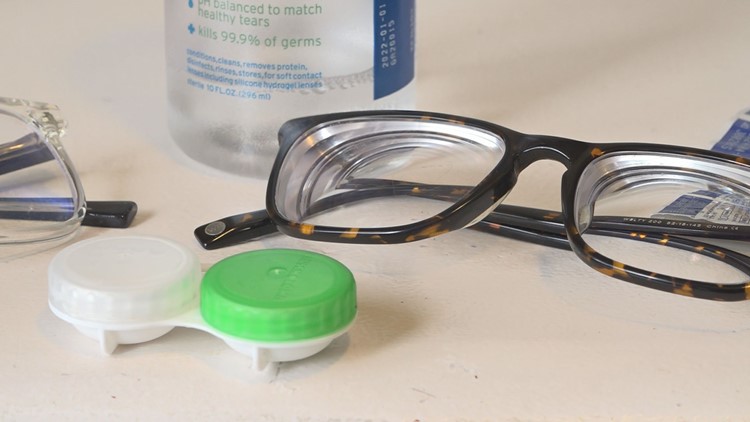The Centers for Disease Control recommends people avoid touching their eyes, nose and mouth with unwashed hands to help prevent spreading germs during the COVID-19 pandemic.
But what about those who wear prescription contacts and glasses? Are there added risks to touching your eyes during a pandemic like COVID-19? Ophthalmologists and optometrists from the University of Alabama at Birmingham provide answers to help you in your decision-making.
Is it unsafe for people who wear contacts to continue doing so during COVID-19?
According to the CDC, there is no evidence to suggest contact lens wearers are more at risk for acquiring COVID-19 than are eyeglass wearers.
“A major mode of transmission of the virus is through touching one’s face with contaminated hands,” said Priscilla Fowler, M.D., director of Cornea Service at Callahan Eye Hospital and assistant professor with the UAB Department of Ophthalmology and Visual Sciences. “Technically, with good handwashing and hygiene techniques, there should be no increased risk of contracting the virus through contact lens wear. However, this also assumes that patients employ good contact lens hygiene, including proper contact lens disinfection and refraining from contact lens over-wear.”
What precautions should contact-wearers take during this time?
UAB School of Optometry Professor and Associate Vice President for Research Jason Nichols, O.D., Ph.D., says thorough handwashing and drying are essential, as well as properly wearing and caring for contact lenses, as Nichols outlined in a peer-reviewed paper on the subject in Contact Lens & Anterior Eye. This also includes ensuring proper care and cleaning of lens cases and regularly cleaning glasses with soap and water — all aspects of care that doctors hope contact lens wearers implement regularly.
“These habits can help you stay healthy and out of your doctor’s office or hospital,” Nichols said. “While we hope that contact lens wearers are already practicing these key hygiene tips, the heightened awareness that a pandemic like COVID-19 brings should serve as a reminder about minimizing any risks for infection at all times.”
Keep your eyes safe with these simple tips from the CDC:
- Do not sleep in your contacts.
- Practice good hand hygiene.
- Keep contact lenses away from all water.
- Properly clean your lenses with the appropriate solution.
- Rinse your contact lens case with contact solution, not water.
- Talk with your eye care provider.
- Carry a backup pair of prescription glasses.
If I am sick, should I wear my contacts?
Nichols says contact lens wearers who are ill should temporarily revert to wearing glasses, which minimizes the opportunity for direct contact with your eye.
“You can resume use with fresh, new contact lenses and lens cases once you return to full health,” he said.
Is there any indication that COVID-19 can be transmitted through one’s eyes?
“Currently, there is no definitive evidence that COVID-19 is transmitted through contact with tear fluid from the eyes,” Fowler said. “There are reports in the literature of the COVID-19 virus’s being detected in the tears of patients with conjunctivitis associated with the illness, but this has not been directly linked to transmission of the virus.”
Should people who have eye conditions wait to see their optometrist or ophthalmologist until things get back to normal?
Both Fowler and Nichols recommend that patients who have a sight-threatening condition such as glaucoma or macular degeneration that needs ongoing treatment should not necessarily forgo their treatment due to current restrictions in place due to COVID-19.
“Hospitals and doctors’ offices are taking extreme precautions to protect their patients and staff from contracting COVID-19, so that they can continue to take care of their patients who need them,” Fowler said. “You should contact your eye care provider if you have an upcoming appointment to determine if you need to proceed with the appointment or reschedule to a later time.”
Click here to learn more about current guidelines at UAB Eye Care.
Click here to learn more about current guidelines for UAB Callahan Eye Hospital and Clinics.
IN OTHER NEWS:



